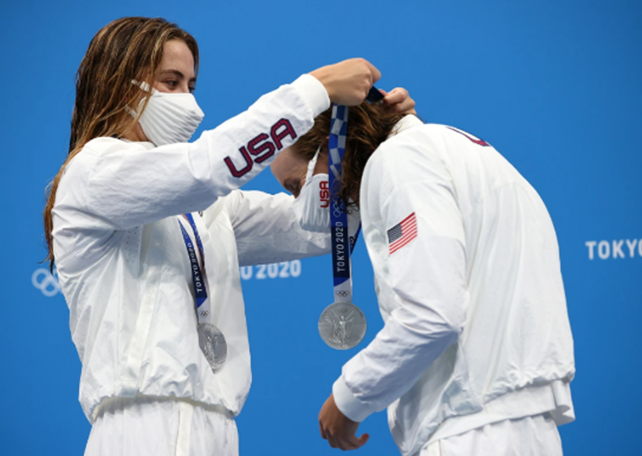It’s Olympic season! I absolutely love watching the Olympics, and I always have. Growing up as a competitive swimmer, collegiate athlete, and one of the team captains for my college swim team, I have a true awe and appreciation for watching the world’s top athletes compete in their sports. I also love watching teams come together as one during the games. As I watch coverage of the events, there is so much more to observe than the sport itself. In fact, there are many foundational elements of success displayed during the games that correlate with successes of business teams. In today’s article, I’d like to highlight three lessons business teams can learn from the Olympics:
1. Every team needs a captain.

Leadership is one of the most important factors when it comes to teamwork in sports and in business. Team leaders, or captains, bring order to chaos and motivate team members when it seems like challenges cannot be overcome. Take Maggie Steffens, for example. For more than a decade, Maggie has been there for the U.S. women’s water polo team. In a recent interview she was quoted saying, “There’s definitely fear of failure. I don’t want to let down my teammates. That, for me, is one of my biggest fears. I hate letting people down.”
In many business situations, even the strongest leaders face difficult circumstances that cause them to have some uncertainty, anxiety, or fear. In the face of those situations, leaders must rise to take immediate action to change the game by motivating the team toward positive solutions and action. Leaders help guide the team toward the goal(s) and help keep the attitudes positive and the behaviors moving in the right direction.
Yes, that feels like a lot of pressure! Yet, it’s also extremely rewarding. Maggie Steffens said, “I love the sport. I love this team. I love, love, love being a part of Team USA.” The rewards of leading teams through peaks and valleys are numerous, yet having a solid team captain can make all the difference to business teams’ performance.
2. Every captain needs a team.

Team dynamics and the ability for individuals to contribute in a group setting are so important. In the Olympics, you see athletes coming together from different teams, different states, and different backgrounds to represent ONE team, their country. This year, during the Olympic medal ceremonies, the gold, silver, and bronze medals are brought to the Olympians on a tray, and the athletes are expected to pick up the medal themselves and place it around their own neck.
What we noticed is that several athletes actually put their own personal touch on the moment, giving each other medals on the podium. This gesture displays the strength, pride, and connection those teammates have to one another, to their sport, and to their country. When team members encourage and support one another, they can accomplish more than if they stood alone.
Business team leaders can encourage this type of behavior by fostering shared experiences and team interactions that encourage several group members to work toward common goals. This will create a sense of shared effort during the difficult times, and a sense of accomplishment during the peak times.
3. Sportsmanship isn’t just for sports.

During the Olympic games, we occasionally get to witness sportsmanship on the grandest scale, where an athlete gives up their chance at success to help someone else in need. During the 2016 Olympic Games, Abbey D’Agostino (USA) and Nikki Hamblin (New Zealand) were competitors in the women’s 5,000-meter event in Rio.
During the race, Nikki suddenly had to slow her pace to avoid contact with another runner which caused Abbey to collide with her from the back, bringing them both to the ground. As Abbey was getting up, she noticed Nikki was injured. She assisted her all the way to the finish line. Even though they came in last, their sportsmanship received as much, if not more news coverage than the medal ceremony for that event.
We just witnessed the same thing in this 2021 Olympic competition with the 800-meter semifinals. U.S. runner Isaih Jewett and Nijel Amos of Botswana fell during the race. They grabbed hands, picked one another up, and crossed the finish line together.
These stories are clear examples of sportsmanship, but how does sportsmanship manifest itself in the business setting? The answer is simple – successful teams use the successes of their team members as fuel to accomplish great things themselves. It is about picking up our teammates when they fall down – we have all had bad days, tough customer conversations, and sales rejections, and could have used a “pick me up” conversation. It is about being able to appreciate what others do on the team, understanding everyone has special strengths, gifts, and talents. Lastly, it is about pushing oneself to do better and realizing that when a team member wins, the entire team wins.
Wishing your team endless gold medals,
Image Credit:
1. Buda Mendes / Getty Images
2. Tom Pennington / Getty Images
3. Patrick Smith / Getty Images



Comments